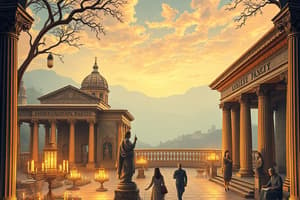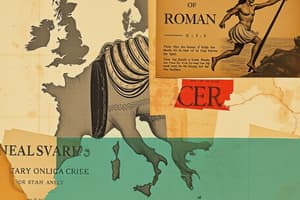Podcast
Questions and Answers
What is a Republic?
What is a Republic?
- A system where supreme power is in citizens able to vote (correct)
- An assembly possessing high legislative powers
- A military commander who became Dictator
- The Roman peace
What does 'Pax Romana' refer to?
What does 'Pax Romana' refer to?
The Roman peace
Who was Julius Caesar?
Who was Julius Caesar?
A military commander who became Dictator
Who was Peter?
Who was Peter?
What is a Consul?
What is a Consul?
Who was Constantine?
Who was Constantine?
What is Constantinople?
What is Constantinople?
What does 'Diaspora' refer to?
What does 'Diaspora' refer to?
Who was Paul in the New Testament?
Who was Paul in the New Testament?
What does the title 'Christ' signify?
What does the title 'Christ' signify?
Who was Augustus?
Who was Augustus?
What is the Aeneid?
What is the Aeneid?
Who was Jesus?
Who was Jesus?
Who was Diocletian?
Who was Diocletian?
What is Latin?
What is Latin?
What is Greco-Roman culture?
What is Greco-Roman culture?
What did Virgil do?
What did Virgil do?
Who were the groups on the Italian Peninsula?
Who were the groups on the Italian Peninsula?
Who were the Patricians?
Who were the Patricians?
Who were the Plebeians?
Who were the Plebeians?
What were the Punic Wars?
What were the Punic Wars?
What was life like for Romans?
What was life like for Romans?
Why were the Jews disliked during Paul's time?
Why were the Jews disliked during Paul's time?
What contributed to Rome's decline?
What contributed to Rome's decline?
What Roman activities are still present?
What Roman activities are still present?
Flashcards are hidden until you start studying
Study Notes
Roman Political Structure
- Republic: A system where citizens with voting rights hold supreme power.
- Senate: The assembly responsible for high legislative authority.
- Consul: One of two officials who governed the ancient Roman Republic.
Key Historical Figures
- Julius Caesar: Military leader who became Dictator; played a critical role in the demise of the Roman Republic.
- Augustus: First emperor who established the Roman Principate, marking the transition from the Republic to an empire.
- Constantine: Roman Emperor (280-337) who embraced Christianity, ending persecutions against Christians.
- Diocletian: An emperor who divided the empire to better manage military and administrative challenges.
Religion and Culture
- Jesus: A Jewish prophet, viewed by Christians as the Son of God, whose teachings led to the founding of Christianity.
- Christ: Title attributed to Jesus, signifying his role and legacy in Christian faith.
- Peter: Leader of the apostles and key figure in early Christianity.
- Paul: A missionary to non-Jews, significant in spreading Christian teachings beyond Jewish communities.
- Greco-Roman Culture: A blend of Greek and Roman cultural elements, influencing art, philosophy, and governance.
Significant Events and Concepts
- Pax Romana: A period of relative peace and stability across the Roman Empire.
- Diaspora: Refers to Jewish communities living outside of Israel, particularly significant in the post-Temple period.
- Punic Wars: A series of three conflicts between Rome and Carthage, ending in Roman victory and expansion.
- Roman Decline: Factors contributing to decline included barbarian invasions, excessive military spending, inflation, and political corruption.
Social Structure
- Patricians: The elite landowning class influencing politics and societal norms.
- Plebeians: The majority population, composed of farmers, artisans, and merchants, often struggling for rights against the Patricians.
Cultural Contributions
- Aeneid: An epic poem by Virgil that narrates the story of the Trojan War and the founding of Rome.
- Latin: The language of ancient Rome, with dialects shaping various Romance languages.
Daily Life and Legacy
- Life for Romans often included severe hardships, wars, and a generally low quality of life.
- Cultural remnants include Roman temples, public games, and monuments like the Pantheon, highlighting the empire's former grandeur.
Studying That Suits You
Use AI to generate personalized quizzes and flashcards to suit your learning preferences.




